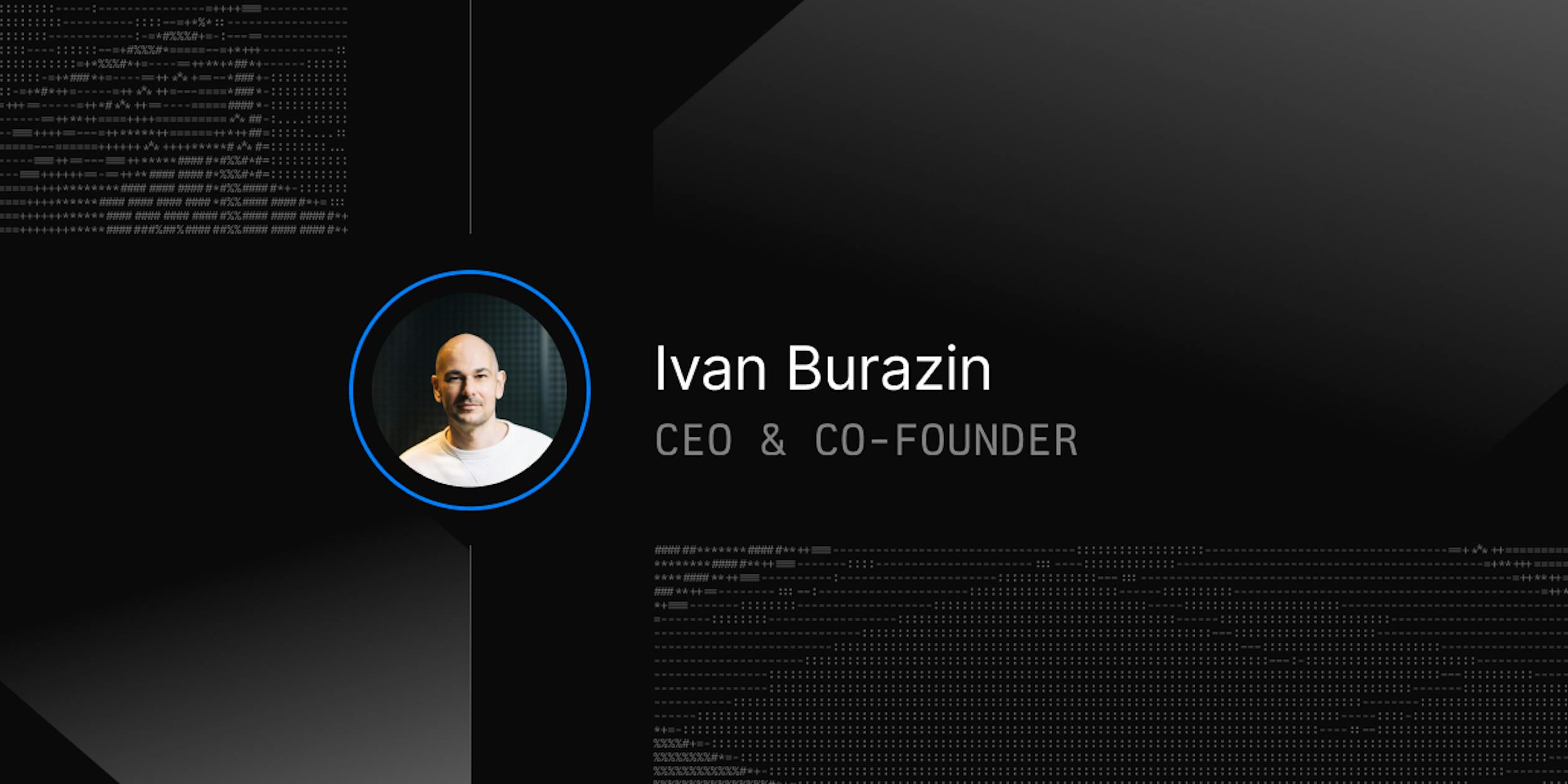Meet Ivan Burazin, the CEO and Co-Founder of Daytona. Ivan's dedication to empowering developers has been the driving force behind his entrepreneurial journey. He believes in the transformative power of standardized development environments and their ability to drive development velocity.
When all the stars align, you have to walk under them. That's exactly what happened with Daytona.
Ivan Burazin
The Journey to Daytona
Ivan's journey began in 2011 when, together with Vedran Jukić, he co-founded Codeanywhere, one of the pioneers in cloud-based integrated development environments. Although Codeanywhere was ahead of its time, it gave Ivan invaluable insights into enhancing the developer experience.
Despite the challenges, the lessons we learned with Codeanywhere have significantly shaped the vision of Daytona.
Ivan Burazin
Following Codeanywhere, Ivan founded Shift in 2012, a developer conference of humble beginnings that grew into one of the most prominent developer conferences in the world and surely one of the largest in Europe. During his time at Shift, Ivan honed his ability to create solutions toward both a B2B audience (think sponsorships) but also B2C or, in this case, B2D by encouraging connections within the vibrant developer community.
In 2020, the conference was acquired by Infobip. A bootstrapped unicorn out of rural eastern Europe, this company is a leading global communications platform provider, taking on Silicon Valley's finest.
Subsequently, Ivan assumed the Chief Developer Experience Officer role at Infobip. However, the seeds for Daytona were planted at Codeanywhere, where Ivan glimpsed the future potential of the standardization of development environments. When technology caught up with the vision, Ivan knew it was time to revolutionize how developers work.
Our goal at Daytona is simple: to empower every developer to be able to, with a single command to set up and start coding in an instant, scalable, and secure development environment.
The Vision for Daytona
Ivan's vision for Daytona goes beyond mere development. He envisions a future where developers of all backgrounds and skill levels can easily set up and work instantly and without worrying about the details, but at the same time, enabling you to do so if you wish. Daytona wants to make software development more accessible, efficient, and fun.
A Conversation with Ivan
Ivan, leaving a secure position on the executive board of a large global company to start Daytona was a bold move, even more so knowing you have your first child on the way. Can you tell us about your decision to start another DevTool company?
Yes, it was certainly an unconventional decision that raised a few eyebrows. Starting another DevTool company wasn't initially part of my plan. However, the overwhelming interest from potential analysts, investors, and customers in a product like Daytona made it clear that the timing was right. Their vote of confidence only reinforces what I already knew to be true from my experience. The developer community needs and wants the standardization of development environments.
During the last year, we have observed a growing demand, especially from enterprise companies seeking solutions to enhance developer velocity and securely scale their development environments. These companies faced challenges related to configuration drift, security vulnerabilities, and maximizing developer efficiency. Based on my research, there were companies that had solved this issue on their own - although all were major tech companies, and they made them for their internal use only, whereas the rest of the market was left empty-handed. It felt like all the experiences and knowledge I had gained throughout my career had prepared me for this moment.
So, to put it briefly. Enterprise teams need it. Security demands it. Infrastructure as code unlocks it. Today IDEs enable it. Analysts and the market confirm it.
Can you highlight the differences between Codeanywhere and Daytona?
Certainly. Codeanywhere was primarily an interface product, a browser-based integrated development environment. Codeanywhere is like Google Docs for software developers. In contrast, Daytona is an infrastructure product. It automates the management of development environments, acting as an orchestrator installed on a company's infrastructure. It divides this infrastructure into workspaces for developers and efficiently manages the required resources.
Another difference lies in how Daytona fits into the DevOps lifecycle. It integrates into the existing flow that developers already know, requiring them to learn almost nothing new. It's the missing piece in your DevOps pipeline - automating the creation phase so developers can spend less time on setup and more time coding.
In contrast, Codeanywhere requires developers to adjust their entire concept of how they're working. With Daytona, development environments are dynamically created, managed, and disposed of based on each developer's needs. This eliminates wasted resources and ensures security by containing environments.
While Codeanywhere was a different type of product, it had the same underlying mission: to increase developer velocity by leveraging the power of the cloud. Despite our modest success, I always felt there was more to be done in this space.
Ivan Burazin
How does Daytona impact developer velocity?
Daytona dynamically creates, manages, and disposes of development environments for each developer. This conserves resources and secures environments. Developers can focus on code delivery without worrying about infrastructure setup and maintenance.
Flexibility is another Daytona specialty. Enterprises can host Daytona in the cloud or on their infrastructure. This flexibility distinguishes Daytona from pure SaaS or managed competitors. We want to let organizations choose the deployment option that best meets their needs because every organization has different needs and constraints.
Automation and standardization are at the core of Daytona. Developers avoid headaches and complexities by automating development environment provisioning and management. A standardized dev environment ensures consistent and reliable environments, allowing for seamless teamwork while retaining developer ownership of the environment.
In my opinion, developers should almost not see tools like Daytona at all. Rather, it just magically works in the background. We want local and cloud infrastructure to work seamlessly so developers can write good code.
In your opinion, what specific needs do companies have that Daytona addresses?
Large enterprises need scalable, secure dev environments. There are several reasons why companies would benefit from a standardized development environment platform. For starters, most companies have limited engineering resources to create this themselves; moreover, they often also lack the time and expertise to build those internal platforms themselves. Daytona offers an off-the-shelf solution that plugs into any developer lifecycle, saving companies the resources required to build it themselves.
Furthermore, security emerged as a significant concern. Many companies required secure development environments that could operate behind their firewalls, ensuring compliance while maintaining a seamless developer experience. Existing cloud-based solutions fell short in this regard, and we saw an opportunity to address this pain point. Daytona stands out as the only company that delivers on both fronts.
Lastly, the rise of infrastructure as code and the ability of popular integrated development environments (IDEs) like IntelliJ and VS Code to work with remote development environments further indicated a growing market need. These trends, combined with market indicators such as the increasing number of remote developers and the excitement around new products like GitHub's Codespaces, reaffirmed the potential for standardized development environments.
How does Daytona improve business outcomes?
Daytona enables organizations to deliver higher-quality software faster by providing automated, standardized development environments. Streamlining infrastructure provisioning and eliminating configuration drift allows developers to spend more time writing and testing code instead of managing environments. Increased velocity leads to more frequent releases with fewer bugs.
Daytona also provides built-in security policies and governance guardrails that reduce risk, while its scalability supports growth and new initiatives without disruption. The resulting acceleration in development productivity translates directly into faster time-to-market, improved customer experiences, and expanded market share for Daytona customers. With a robust platform that delights developers while aligning with business goals, Daytona is uniquely positioned to help organizations harness the power of development velocity for their competitive advantage.
Can you share your vision for the future of development and how Daytona can shape this landscape?
Daytona's vision is to empower every developer to effortlessly set up and work in instant, scalable, and secure development environments. We want to catalyze change in the software development industry, making development more accessible, efficient, and enjoyable for everyone involved.
Ultimately, we envision a world where every developer can unleash their full potential and achieve remarkable results, whether in a Fortune 500 company or an aspiring hobbyist.
The doors to real change have opened, and I've decided to walk through them with my long-term collaborators and friends, now co-founders Vedran and Goran, and our talented team.
By making environment management easier and connecting developers across the cloud, Daytona is set to help usher in a time of unprecedented collaboration and creativity. I'm very excited about Daytona's future and how it will affect the development community.
If you are interested in continuing this conversation, feel free to reach out on X/Twitter.
The future should not be about getting developers to use new tools but rather about improving the tools they already love.
Ivan Burazin



